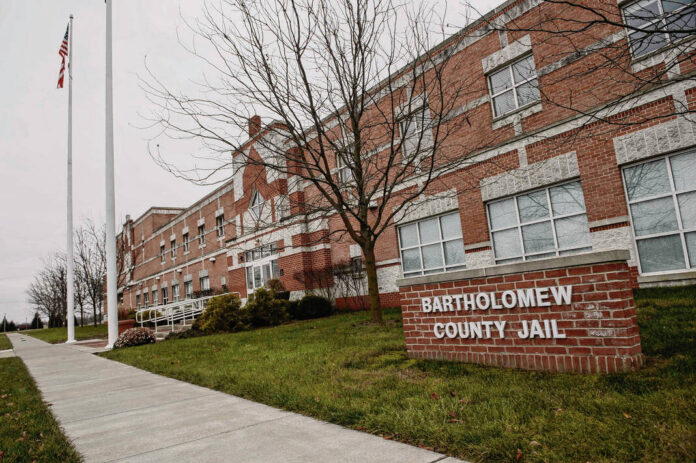
Mike Wolanin | The Republic The exterior of the Bartholomew County Jail in Columbus, Ind., pictured Friday, Dec. 15, 2017.
Mike Wolanin | The Republic The exterior of the Bartholomew County Jail in Columbus, Ind., pictured Friday, Dec. 15, 2017.
The Bartholomew County Commissioners have amended a contract with the Nashville, Tennessee-based Advanced Correctional Healthcare that provides jail inmates with access to a mental health professional working 40 hours a week.
The amendment formalizes a decision made by the Bartholomew County Council last August, which came just a few months after the Indiana Criminal Justice Institute provided a $187,000 grant to the Bartholomew County Jail.
While Advanced Correctional Healthcare, a supplemental nursing service, has been providing medical and mental health services, they did not have the ability to bill the county until the three commissioners signed off on the amendment this month.
“We know that there are too many people suffering from serious mental illness that end up in the justice system, and many county jails are not equipped to provide them the treatment that they need,” said Indiana Department of Mental Health and Addiction Director Jay Chaudhary.
Maintaining both funding and staff to provide those services has been a challenge in the past year.
First, the Bartholomew County Jail lost a $95,000 grant from the U.S. Department of Justice to provide mental health services last August.
One month later, Addiction Treatment Coordinator Theresa Patton resigned from the jail staff and moved to California.
Averaging about 240 inmates each day, inquiries were made to see if insurance companies would help pay for at least some of the required medications.
But jail commander Maj. John Martoccia said most companies immediately drop coverage when someone is booked into a jail.
Although Advanced Correctional is supplementing medical and mental health care, the company does not provide medications. Instead, the jail pays for and acquires all prescribed drugs, Martoccia said.
And if an inmate has a severe psychiatric issue, options are extremely limited because most psychiatric institutions won’t accept a person who is incarcerated, the jail commander said.
“So they stay here,” Martoccia told the commissioners.
In addition, COVID-19 has created or complicated multiple complex health needs in jail inmates, Circuit Court Judge Kelly Benjamin said in an interview late last year.
The judge said that includes a higher rate of preexisting mental disorders, suicide ideation and self-harm. Those needs and problems surface because some inmates feel stuck behind bars indefinitely with those who might be spreading the disease, Benjamin said.
When Martoccia was asked this month how the full-time mental health professional was working out, his answer reflected what Benjamin has said earlier.
“He’s become a very busy man these days,” the jail commander said.




